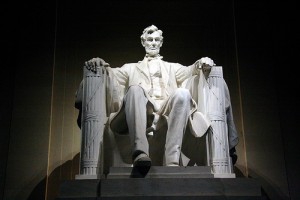When we think of the people we know who stand on the other side of a controversial issue, we do not wish to belittle them. We treat them the way we would wish to be treated ourselves. We seek to persuade them with our view. Sometimes our principles prevent agreement, and neither of us will budge, but we can accept that the differences between us are based on our best intentions for our country. It does not mean that we should compromise our principles when we disagree.
On March 4, 1865, Abraham Lincoln rose to give his second inaugural address to a country deeply divided, suffering from the wounds of war and the loss of hundreds of thousands of lives. Lincoln could have increased the divide or brought forth even more hardship for the South, but he chose words that we could use in our political discussion today. “With malice toward none; with charity for all, with firmness in the right as God gives us to see the right …”
He could have spoken as victor over the defeated, as North verses South, but he saw both sides as American. His generosity elevated him above the petty and vindictive. Unfortunately, Lincoln’s death led to policies that ignored his vision, that punished rather than forgave and that made the journey toward recovery more difficult. Lincoln demonstrated the power of a leader who retained his humility and compassion in victory.
Today, too many of our leaders seem to see each other only as enemies, as Democrat and Republican, as partisan rather than principled. Politicians do themselves a great favor when they learn to appreciate honest differences of opinion and recognize that they can learn from others who are equally passionate in their differing beliefs.
The world of politics is one that can be filled with inspiration, the belief that our goals are attainable if we care enough, work hard enough and stay true to our principles. At the same time, politics is full of pettiness and fighting that pull us down and discourage us. Since I have been able to vote, both our presidents have been compared to 20th-century dictators. It is disheartening to presume the least of our leaders.
If we focus on the great ideals and opportunities, we see that people come forward from all walks of life because they have been inspired to improve their world. Most have certain principles they will not compromise or betray even if they lose an election. It is admirable when they stand with conviction on an issue.
We must accept that when immoveable principles collide, politics can become contentious. If Lincoln hoped to heal the wounds of war with his words, a solution to our current problems shouldn’t be that far out of reach. How could Lincoln reach out so compassionately to his “enemies” at the end of such a bitter conflict? In his humility, he saw that neither side was wholly virtuous and that neither side was wholly evil.
We can be thankful over the course of our country’s history for the greatness that has come from leaders who will look past personal differences, understanding that we all come with unique perspectives. The best leaders bring us all closer together through gracious treatment of their adversaries.

Pingback: melvin
Pingback: roy
Pingback: gerard
Pingback: ralph
Pingback: Earl
Pingback: Kyle
Pingback: tyrone
Pingback: jeff
Pingback: gerard
Pingback: Carlton
Pingback: eric
Pingback: fernando
Pingback: homer
Pingback: Ronnie
Pingback: Michael
Pingback: casey
Pingback: Willard
Pingback: Jamie
Pingback: ron
Pingback: Gene
Pingback: arnold
Pingback: Steve
Pingback: Joe
Pingback: Henry
Pingback: leon
Pingback: Cory
Pingback: arturo
Pingback: steven
Pingback: Terrance
Pingback: darrell
Pingback: albert
Pingback: lance
Pingback: Fredrick
Pingback: Derek
Pingback: William
Pingback: stuart
Pingback: Julian
Pingback: Lloyd
Pingback: Barry
Pingback: robert
Pingback: Paul
Pingback: Brandon
Pingback: Rick
Pingback: john
Pingback: Shannon
Pingback: michael
Pingback: Nathan
Pingback: Everett
Pingback: maurice
Pingback: manuel